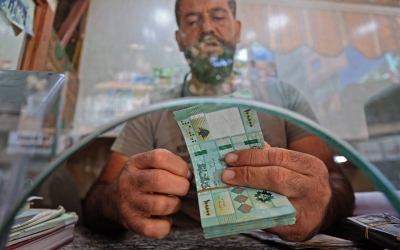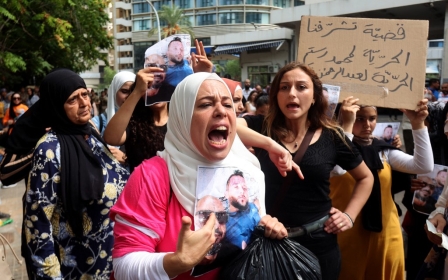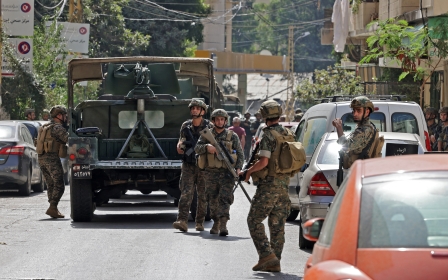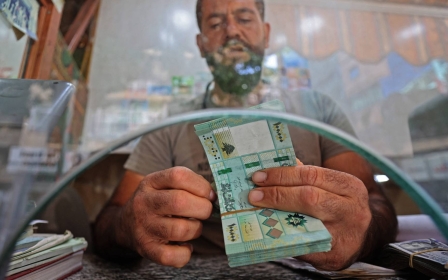For the lucky few, the world's cheapest mortgages are in Lebanon
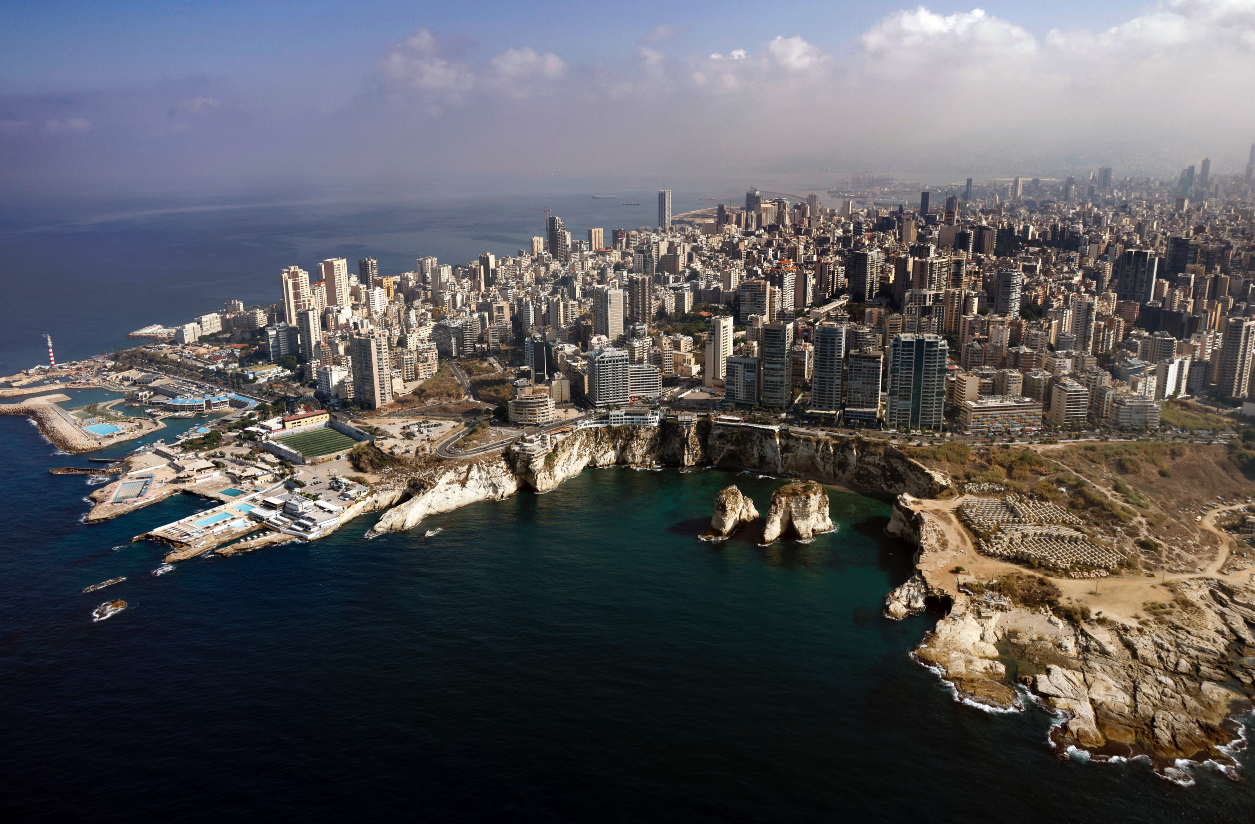
Ali* shuffles into a home goods shop in Beirut's Basta neighbourhood with a cheque for $25,000. Mohammad, the store's 42-year-old owner, is waiting and smiling - not because the newcomer is making a purchase, but a sale.
In exchange for the cheque, Mohammad produces $4,500 in crisp dollar bills laid out neatly at his desk. "At this rate, it will only be a few months before I finish with my mortgage," the shopkeeper tells Middle East Eye.
The transaction is just one example of those taking place each day in Lebanon, where traders such as Ali connect depositors whose funds have been trapped inside Lebanese banks to buyers with access to fresh US dollars.
'People are clamouring to pay off their mortgage'
- Khalil Debs, deputy group CEO of Bank Audi, Beirut
Since Lebanon's economic crisis erupted in 2019, banks have imposed strict limits on withdrawals. Some desperate Lebanese have taken to holding them up to try and retrieve their savings, others are selling cheques on the black market at a fraction of their value.
By law, banks are required to accept the cheques, which have been dubbed "local dollars" or "lollars". They can't be used to withdraw cash, but can be used to pay off loans at the bank.
The going rate for a "lollar" cheque is about 15 percent, meaning holders of mortgages, or other loans, are getting an 85 percent markdown on their debt.
Mohammad is far from the only one in Lebanon racing to pay off his mortgage, even as the country grapples with what the World Bank says is one of the world's worst economic crises.
"We have prepayments every day. This is the reality," Khalil Debs, deputy group CEO of Bank Audi, one of Lebanon's largest banks, told MEE in an interview from the company's boarded-up headquarters in downtown Beirut.
"An official from the French housing ministry visited and asked about advising us on helping to protect homeowners. I told him 'what are you talking about? People are clamouring to pay off their mortgage', he was shocked," Debs said.
Borrowers are 'the lucky ones'
At Bank Audi, about 94 percent of all mortgages denominated in US dollars have been settled, Debs said.
"Before the crisis, our housing loan portfolio in foreign currency was $1bn, today it's at about $50m - we've been totally wiped out."
Two regional bank managers who spoke with MEE on condition of anonymity said their banks had already closed all mortgages denominated in US dollars.
"Everyone has paid off their debt. Only in Lebanon," one bank mangaer told MEE. "We are in a financial crisis with no foreclosures. I wish I had a mortgage."
Those who borrowed in Lebanese pounds have seen their debt practically evaporate. The impoverished Mediterranean country's currency has lost more than 95 percent of its value against the US dollar. But Lebanon has not created a uniform exchange rate.
'We are in a financial crisis with no foreclosures. I wish I had a mortgage'
- Lebanese bank manager
One result of this is that loans in Lebanese pounds have been frozen at the government’s official rate before the crisis, 1,500 pounds to the dollar, even as a dollar fetches about 35,000 pounds on the black market.
For 60-year-old businessman Nabih*, who lives in Beirut's Aisha Bakkar neighbourhood, that means a 97 percent drop in his mortgage payment.
"I used to pay the equivalent of 4,000 USD a month in Lebanese pounds, now I pay $120 a month," he said.
Nabih has already paid off mortgages he took out for two rental apartments before the crisis, but the bank has prevented him from closing the balance on the remaining one. "I never deposited with the banks. I always borrowed. In this crisis, those who borrowed have all the luck."
The few
To be sure, those profiting from what is a debt forgiveness bonanza are in the minority as the country experiences an economic meltdown. Food and medicine are running short amid hyperinflation. More than two-thirds of Lebanese are living in poverty.
Real estate prices in Lebanon have also dropped on average nationally between 40 and 50 percent since the crisis, somewhat reducing the impact of effective mortgage discounts.
"For the normal Lebanese person whose salary is in Lebanese Lira, that person couldn't afford to close their loan," Leila Dagher, an associate professor in the Department of Economics at the American University of Beirut, told MEE.
Most people in Lebanon are paid in the local currency. At the current black market exchange rate, the national monthly minimum wage hovers at about $25 a month, down from $475 before the crisis.
Still, those who worked in the private sector, or have access to remittances from abroad, are still trying to take advantage of the currency's collapse.
Lynn, a 35-year-old unemployed bank teller wants to settle her car loan, which cost her $322 a month before the crisis.
"Today, I pay 600,000 Lebanese pounds [about $18 a month]. I haven't managed to pay it off in full because the bank says settlements are reserved for personal loans," she said.
Some Lebanese in the private sector have been able to obtain salaries split between lira and dollars. The diaspora has also historically supported the economy with remittances, which totaled $6.2bn in 2021 - or 32.9 percent of the country's GDP - according to the World Bank.
But a study by the American University of Beirut released in August revealed that only 13 percent of 971 households sampled had access to fresh dollars.
"Borrowers have only benefited from the currency devaluation if they have access to fresh dollars and it's very few," Dagher said.
Lebanese from abroad who have managed to live and work remotely back in their home country have also benefited, especially those with a US salary.
Maria*, 28, who works in communications, splits her time between Washington DC and her hometown of Jounieh. She settled a loan originally valued at $15,000 before the crisis on her Audi A3 for $2,000.
Like others who spoke with MEE for this article, she asked that her name be withheld. "I wouldn't want people to know I took advantage of the situation," she said.
Middle East Eye propose une couverture et une analyse indépendantes et incomparables du Moyen-Orient, de l’Afrique du Nord et d’autres régions du monde. Pour en savoir plus sur la reprise de ce contenu et les frais qui s’appliquent, veuillez remplir ce formulaire [en anglais]. Pour en savoir plus sur MEE, cliquez ici [en anglais].


